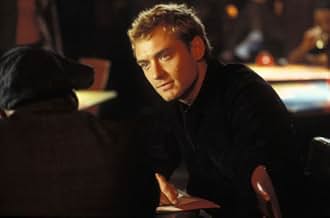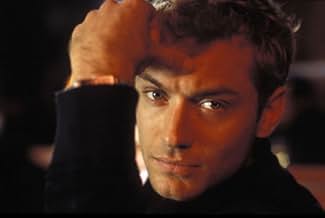IMDb RATING
6.2/10
56K
YOUR RATING
A cockney womanizer learns the hard way about the dangers of his actions.A cockney womanizer learns the hard way about the dangers of his actions.A cockney womanizer learns the hard way about the dangers of his actions.
- Awards
- 7 wins & 8 nominations total
Renée Taylor
- Lu Schnitman
- (as Renee Taylor)
Featured reviews
Not a lot of people know this, but Terence Stamp first played the role of Alfie on stage over thirty years ago. He was then offered the film role, but turned it down. His flatmate, a struggling up and coming actor, tried to convince him to take the part, but Terence was not budging. And so his flatmate took the role. His name, was Michael Caine, and that film, Alfie, spring boarded the young actor to be the most famous cockney in the world. Of all Caine's films this ranks alongside Get Carter and The Italian Job as his best, and so why re-make it I hear you cry! Hollywood had a go at remaking The Italian Job and Get Carter but only came out with turkeys so big you couldn't fit them in your oven. But instead of remaking a Michael Caine film that wasn't good (THE SWARM, BLAME IT ON RIO!) Caine's golden classic Alfie has had the makeover, with pretty boy Jude Law bought in to ask what it's all about. Well for those who don't know what it's all about, Alfie's world is women, pulling them and dumping them. Sounds a little cold, but that is Alfie, a bird puller extraordinaire who lives for the conquests, but soon bores of them whenever commitment rears it's ugly head. Of course Alfie has to be bought down a peg or two, and this happens as a result of another conquest, which has further reaching consequences than Alfie can realize. But should Alfie have been dusted down for the 2004 audience? Well the answer is no. But why? Well, to analyse this we have to go back to the beginning and what Alfie was in Caine's day. Alfie was a man about town stuck in the poor end of London, sleeping his way through a never ending supply of 'birds' while fighting his working class shackles. Back then women were not the powerful sex they are today, at least not on the cinema screen, and were happy to get Alfie's dinner and scrub his floors. Now lets look at Jude Laws Alfie, living in present day New York, and sleeping with a seemingly never ending amount of stunners, who all seem to be getting as much out of him as he gets out of them. And so what's he got to fight against? Not his surroundings (he's in glamorous Manhattan) and his job isn't that bad (still a driver, but look at the perks), and he even likes the kid of one of his girlfriends. And so he's a nice guy, and there is problem 1, bang goes Alfie's cold side. And so what we are left with is a man who lives in New York and finds it hard to commit. Hardly a rare phenomenon. Problem number 2 is the original Alfie movie's use of the shock factor. Denholm Elliott turning up to do a back street abortion was enough to make some walk out the cinema in 1966. In this film the subject of abortion, although delicately handled, has lost it's cinematic impact, which is no doubt due to the three decades that has passed between films. And so we come to problem number 3, the films flaw being that the Alfie of today is simply not as relevant to the Alfie of yesterday. Today we have 'Sex and the City', empowered women, whom one can't help but feel would eat Alfie up alive. Indeed, the film would be more realistic if the lead was a female, although that would send traditionalists (like myself) running up the nearest tree. The makers of this re-make obviously think that illnesses has to be stepped up, and so while Caine's Alfie was given shadows on his lung to make him give pause, Law's Alfie gets a lump on his
erm
'Big Ben' (I hope to God that's not the new word for it) But what about performances? Well, Law as Alfie is fine, giving emotion where its needed, although his performance does not bounce along like Caines did. When Caine spoke to the camera, immediately breaking the fourth wall and bonding with the audience, it was the height of cool, when Law does the same it feels cheesy, and like cheese, it soon starts to grate. Susan Sarandon, as the sexy older woman, certainly fulfils her characters description, while Sienna Miller gives a promising portrayal as a young women who looks like a young Marianne Faithful (circa 1965) minus her Rolling Stone. And so the blame for the films failure cannot be left at its actors doors, nor its director. The film is simply a victim of its time. Alfie belongs in the sixties, when the world (or London at least) was swinging. Right now the only thing swinging is the cinema doors, and that's because I've just left.
... as I haven't (FAR too young when it originally came out!), and can judge the movie without preconceptions, it's actually quite, quite good. From others' comments, I believe this should be called a reconception rather than a remake - and face it, if they followed the original, time-bound character/plot, it really WOULDN'T work today - so there is no sense in decrying that this isn't slavish to the Caine version. On its own terms, the movie is very stylish, with excellent cinematography, directing and editing, and the acting is top-notch across the board [For Broadway aficionados, look for Tony winners Jefferson (I Am My Own Wife) Mays as the Doctor and Hairspray's Dick Latessa as Joe].
Law is disarmingly charming as Alfie, and that goes a long way in selling the character, and making his attitude towards women somewhat tolerable. Of the women, Sarandon {looking incredible for 58! ... and delivering her final coup de grace with devilish elan], Long, Krakowski and especially (surprisingly?) Law's current squeeze Miller all make strong impressions. Tomei is OK, but is really neither attractive or special enough to justify Law's interest in her [and his fixation on her young son is a little creepy/unbelievable for such a womanizer]. The substitution of the interracial dalliance with Long for the abortion is a stroke of genius, as it will probably have the same 'shocking' effect for some in the audience. Yes, the direct address is a little jarring at times, but is necessary and DOES follow the original.
On the minus side, the Mick Jagger/Dave Stewart music DOESN'T work, but Joss Stone's remake of the title song is effective. If you can forget, or better yet, haven't seen the original to compare this version to, I think you will find it a very entertaining, relevant movie (compared to most Hollywood remake dreck). I wouldn't even be surprised to find this garnering quite a few Oscar noms (given this year's weak field) come the end of the year... Give it a chance.
Law is disarmingly charming as Alfie, and that goes a long way in selling the character, and making his attitude towards women somewhat tolerable. Of the women, Sarandon {looking incredible for 58! ... and delivering her final coup de grace with devilish elan], Long, Krakowski and especially (surprisingly?) Law's current squeeze Miller all make strong impressions. Tomei is OK, but is really neither attractive or special enough to justify Law's interest in her [and his fixation on her young son is a little creepy/unbelievable for such a womanizer]. The substitution of the interracial dalliance with Long for the abortion is a stroke of genius, as it will probably have the same 'shocking' effect for some in the audience. Yes, the direct address is a little jarring at times, but is necessary and DOES follow the original.
On the minus side, the Mick Jagger/Dave Stewart music DOESN'T work, but Joss Stone's remake of the title song is effective. If you can forget, or better yet, haven't seen the original to compare this version to, I think you will find it a very entertaining, relevant movie (compared to most Hollywood remake dreck). I wouldn't even be surprised to find this garnering quite a few Oscar noms (given this year's weak field) come the end of the year... Give it a chance.
Why turn "Alfie" into a chick flick?
Maybe for those who mis-remembered the bright, scabrous, creative original. I'm finding that most reviewers are remembering it incorrectly, whereas I saw it for the first time the weekend before I saw this too-pretty make-over.
Most reviewers remember it as black-and-white, which it wasn't.
Most remember it as reflective of the Swinging '60's of London, but the mise en scene was London at the cusp, as attitudes were just starting to change, so characters were flopping in moral confusion.
Most remember the women as pre-liberation, but their passivity was more complicated; Alfie had an unerring ability to hone in on women with horrificallly low self-esteem, regardless of their marital or economic status.
Michael Caine is such an established actor now, none remember that he was not a conventionally handsome lead to be conquering all these women, let alone that he was a cocky Cockney like the Angry Young Man of the period kitchen sink British dramas.
Few remember just how heartless he was - calling all his conquests "it".
None seem to remember how vividly babies and abortion figure into the plot, a la "Vera Drake."
The new version is confused about all these elements.
The cinematography is beautiful, but has to cover up for the fact that while it supposedly takes place in New York City, it was actually filmed in Manchester, England so is missing atmosphere that's so critical to the same ground that's trod in "Sex and the City;" frequent background mattes of the Brooklyn Bridge are weak atmosphere-builders . And this is also some sort of retro NYC that allows smoking in bars and doesn't require helmets on mopeds, which is also a retro means of individual transport.
The film probably takes place in the '00's - but the flashy split screens and the women's make-up and styles are retro-'60's. "Keen Eddie"'s Sienna Miller is made up as a duplicate of the original's Jane Asher. Marisa Tomei even has her hair in a flip with a wide head band and Nia Long is made up like "Cleopatra Jones" from the early '70's.
At least one time we do get a glimpse of a condom package, but that's only obvious now because films today show them, not that they weren't used in the '60's; it does take place in post Roe v. Wade NYC.
The women's personality upgrades are inconsistently effective and there's no drama to how the incredibly beautiful, posh-sounding Jude Law captures them.
Susan Sarandon's self-assured, independent entrepreneur is a sexy, believable update of Shelley Winters' rich widow, making her closing dig at Alfie as a gigolo even more devastating.
Miller's character is now trendily manic depressive, or some such chemically-dependent disorder, rather than just an insecure runaway, which weakens Alfie's hold on her; that character's passive aggressive manipulation of him and how she bypasses him to straighten out her life are missing completely, so we lose some insight into both his cruelty and comeuppance.
Long's character's crisis is weakened from the original's, as her pregnancy conflates two different affairs, with the emphasis instead put on male friendship betrayal, the friend that this "Alfie" claims in passing calls his women "it".
"Alfie"'s health scare had to be updated from TB, and the cancer testing is done for laughs; the lack of mention of Viagra is odd if it is in fact taking place now. Here the older male confidante is stuck in deus ex machina, rather than in plot context.
While the original stands up 35 years later as a mordant and brilliant, matter of fact presentation of "moral lapses," the mild update is considerably weakened and Hollywoodized as respectable company, such that the finale doesn't even segue smoothly into the first musical line of "What's it all about?"
The soundtrack selections are otherwise excellent, but as confusingly retro as the rest of the atmosphere, with neo-soul teen Joss Stone singing and Mick Jagger collaborating with Dave Stewart on originals that sound old.
Maybe for those who mis-remembered the bright, scabrous, creative original. I'm finding that most reviewers are remembering it incorrectly, whereas I saw it for the first time the weekend before I saw this too-pretty make-over.
Most reviewers remember it as black-and-white, which it wasn't.
Most remember it as reflective of the Swinging '60's of London, but the mise en scene was London at the cusp, as attitudes were just starting to change, so characters were flopping in moral confusion.
Most remember the women as pre-liberation, but their passivity was more complicated; Alfie had an unerring ability to hone in on women with horrificallly low self-esteem, regardless of their marital or economic status.
Michael Caine is such an established actor now, none remember that he was not a conventionally handsome lead to be conquering all these women, let alone that he was a cocky Cockney like the Angry Young Man of the period kitchen sink British dramas.
Few remember just how heartless he was - calling all his conquests "it".
None seem to remember how vividly babies and abortion figure into the plot, a la "Vera Drake."
The new version is confused about all these elements.
The cinematography is beautiful, but has to cover up for the fact that while it supposedly takes place in New York City, it was actually filmed in Manchester, England so is missing atmosphere that's so critical to the same ground that's trod in "Sex and the City;" frequent background mattes of the Brooklyn Bridge are weak atmosphere-builders . And this is also some sort of retro NYC that allows smoking in bars and doesn't require helmets on mopeds, which is also a retro means of individual transport.
The film probably takes place in the '00's - but the flashy split screens and the women's make-up and styles are retro-'60's. "Keen Eddie"'s Sienna Miller is made up as a duplicate of the original's Jane Asher. Marisa Tomei even has her hair in a flip with a wide head band and Nia Long is made up like "Cleopatra Jones" from the early '70's.
At least one time we do get a glimpse of a condom package, but that's only obvious now because films today show them, not that they weren't used in the '60's; it does take place in post Roe v. Wade NYC.
The women's personality upgrades are inconsistently effective and there's no drama to how the incredibly beautiful, posh-sounding Jude Law captures them.
Susan Sarandon's self-assured, independent entrepreneur is a sexy, believable update of Shelley Winters' rich widow, making her closing dig at Alfie as a gigolo even more devastating.
Miller's character is now trendily manic depressive, or some such chemically-dependent disorder, rather than just an insecure runaway, which weakens Alfie's hold on her; that character's passive aggressive manipulation of him and how she bypasses him to straighten out her life are missing completely, so we lose some insight into both his cruelty and comeuppance.
Long's character's crisis is weakened from the original's, as her pregnancy conflates two different affairs, with the emphasis instead put on male friendship betrayal, the friend that this "Alfie" claims in passing calls his women "it".
"Alfie"'s health scare had to be updated from TB, and the cancer testing is done for laughs; the lack of mention of Viagra is odd if it is in fact taking place now. Here the older male confidante is stuck in deus ex machina, rather than in plot context.
While the original stands up 35 years later as a mordant and brilliant, matter of fact presentation of "moral lapses," the mild update is considerably weakened and Hollywoodized as respectable company, such that the finale doesn't even segue smoothly into the first musical line of "What's it all about?"
The soundtrack selections are otherwise excellent, but as confusingly retro as the rest of the atmosphere, with neo-soul teen Joss Stone singing and Mick Jagger collaborating with Dave Stewart on originals that sound old.
The original 'Alfie,' released in 1966, was considered a revelation for its frank and somewhat dark portrait of the life of a cockney rake, and can now be seen as somewhat prophetic, as it predated (and in some ways helped to introduce) the era of 'swinging London' and the sexual revolution. The 2004 'Alfie' seems to exist for no other purpose than to dress Jude Law up in a hip wardrobe and allow him to wink, smirk, and sigh endlessly at the camera as he sleeps his way through a series of likable women he doesn't deserve. There isn't much of a narrative structure here, and while Law is an engaging screen presence, Alfie is a totally unsympathetic lout who deserves his eventual comeuppance.
It's too bad that Bill Naughton wasn't able to update his original story more effectively, because the film is gorgeous to look at. Despite a few unnecessary bits of cleverness (billboards with odd, art-nouveau messages like 'desire' and 'wish', a lot of mod-ish split screen sequences with still photography, etc.), the cinematography is superb, Law looks dashing in his GQ hipster wardrobe, and the ladies--Susan Sarandon, Jane Krakowski, Nia Long, Marisa Tomei, and newcomer Sienna Miller (whom Law apparently dumped his wife for during filming)--are ravishing. The soundtrack is also superb, made up mostly of new tunes by Mick Jagger and Dave Stewart (of Eurythmics fame).
The biggest problem here is that times have changed since the original Alfie: sexual and gender politics don't allow for a protagonist who bed-hops and deceives women with impunity to be cast as heroic or even remotely sympathetic. In the end, the film seems hollow, like a nearly two-hour long visual fashion spread (interestingly, 'Vanity Fair' editor Graydon Carter has a cameo in the film). Beautiful to look at, but ultimately it's just pretty trash.
It's too bad that Bill Naughton wasn't able to update his original story more effectively, because the film is gorgeous to look at. Despite a few unnecessary bits of cleverness (billboards with odd, art-nouveau messages like 'desire' and 'wish', a lot of mod-ish split screen sequences with still photography, etc.), the cinematography is superb, Law looks dashing in his GQ hipster wardrobe, and the ladies--Susan Sarandon, Jane Krakowski, Nia Long, Marisa Tomei, and newcomer Sienna Miller (whom Law apparently dumped his wife for during filming)--are ravishing. The soundtrack is also superb, made up mostly of new tunes by Mick Jagger and Dave Stewart (of Eurythmics fame).
The biggest problem here is that times have changed since the original Alfie: sexual and gender politics don't allow for a protagonist who bed-hops and deceives women with impunity to be cast as heroic or even remotely sympathetic. In the end, the film seems hollow, like a nearly two-hour long visual fashion spread (interestingly, 'Vanity Fair' editor Graydon Carter has a cameo in the film). Beautiful to look at, but ultimately it's just pretty trash.
This was one of the worst movies that I have been subjected to in a long time. It didn't quite know if it was: A) a chick flick because of Jude Law consuming the screen every single moment B) a manly flick because of all the hot women running around half naked.
C) Or just a hodge podge of doomed relationships/one night stands.
The movie didn't quite know what it was and left us in the same perturbed state as its main character.
Jude was adorable, the NYC life was fun to watch, but overall the movie lacked substance. And not to mention the lack of social awareness when it came to the women in the film.
Stay away... unless of course you have an undying love for Jude Law. But after sitting through this your love will wither away!
C) Or just a hodge podge of doomed relationships/one night stands.
The movie didn't quite know what it was and left us in the same perturbed state as its main character.
Jude was adorable, the NYC life was fun to watch, but overall the movie lacked substance. And not to mention the lack of social awareness when it came to the women in the film.
Stay away... unless of course you have an undying love for Jude Law. But after sitting through this your love will wither away!
Did you know
- TriviaSusan Sarandon gave pictures of herself in the 1970s to British artist Russell Oxley, who used them to paint an acrylic portrait of her character, supposedly from that era. After filming, the canvas went home with Sarandon.
- GoofsRight after the flower shop scene, Alfie rides his scooter to Liz's place. Only the flowers are not in the basket or anywhere on the scooter. Yet as he comes around the corner of the stairs towards the apartment, he has the flowers in his hand.
- Quotes
[last lines]
Alfie: What have I got? Really? Some money in my pocket. Some nice threads, fancy car at my disposal, and I'm single. Yeah... unattached, free as a bird... I don't depend on nobody. Nobody depends on me. My life's my own. But I don't have peace of mind. And if you don't have that, you've got nothing. So... So what's the answer? That's what I keep asking myself. What's it all about? You know what I mean?
- Crazy creditsThe producers wish to thank residents and businesses of Northern Quarter Manchester
- SoundtracksAlfie
Written by Burt Bacharach & Hal David
Performed by Joss Stone
Produced by David A. Stewart (as Dave Stewart) & Mick Jagger
Joss Stone performs courtesy of S-Curve Records/EMI Music North America
- How long is Alfie?Powered by Alexa
Details
Box office
- Budget
- $60,000,000 (estimated)
- Gross US & Canada
- $13,399,812
- Opening weekend US & Canada
- $6,218,335
- Nov 7, 2004
- Gross worldwide
- $35,060,882
Contribute to this page
Suggest an edit or add missing content






























